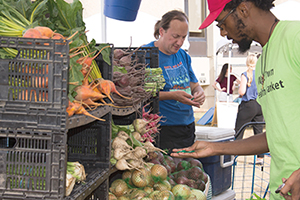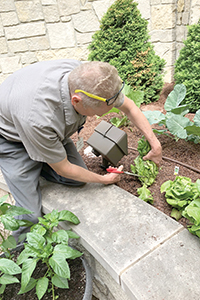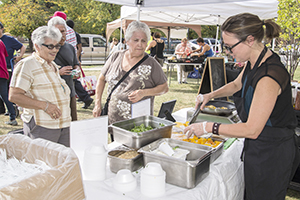By BETSY TAYLOR
When health needs assessments show that access to affordable, healthy foods is an ongoing challenge in communities, health care systems and their area partners are coming up with targeted approaches to get fresh, nutritious foods to those who need it.

A variety of fresh, seasonable vegetables are sold at the West Town Health Market on the campus of Presence Saints Mary and Elizabeth Medical Center in Chicago.
Recent efforts include a mobile food market, gardens for growing and then donating veggies, and a hospital-based farmers' market that has the added benefit of creating jobs for young people and giving neighborhood residents a place to get out of their homes and socialize.
Nutrition on wheels
In Douglas County Oregon's rich agricultural region, food deserts are everywhere. A person who wants to get fresh produce, milk or meat and doesn't have a car may have to ride for an hour and a half one way on public buses to a grocery store, and then only be able to buy what they can carry home. Soon though, a mobile food store will bring fresh food at low prices closer to their homes.
The Mercy Foundation is using private donations and a grant from the Umpqua Health Alliance Coordinated Care Organization to fit out a recreational vehicle with shelving, refrigerators, freezers and a stove for cooking demonstrations. That's according to Shawn Watson, grant writer for the Mercy Foundation. The foundation supports CHI Mercy Health Mercy Medical Center, both in Roseburg, Ore.
Catholic Health Initiatives' Mission and Ministry Fund kick-started the Douglas County mobile food market in July, with a three-year grant of more than $275,000.
The CHI funds will allow for an employee of the area's United Community Action Network, a local anti-poverty organization, to be hired as a market coordinator. The money will fund inventory, educational materials and fuel.
Oregon State University Extension Service is connecting area farmers to the mobile food market to sell their produce and other goods, which could include fresh meat and fish. Customers will be able to pay with cash, credit and Supplemental Nutrition Assistance Program benefits, said Lisa Platt, the Mercy Foundation's president.
Proceeds from sales will be invested in the program to keep food affordable.
The mobile food market will visit parts of Roseburg weekly that are not near a grocery store, and communities from 15 to 50 miles from the city. Some details, including the market's launch date and location schedule, are still being ironed out.
Urban market
On the campus of Presence Saints Mary and Elizabeth Medical Center in Chicago, Presence Health is in its second year of organizing and hosting the West Town Health Market, a farmers' market. The market is open on Thursday afternoons, from June into December.

Dan Rocheleau harvests lettuce from a vegetable garden at HSHS St. Mary's Hospital Medical Center in Green Bay, Wis., for donation to a local food pantry. Cancer survivors tend the plot as part of a gardening and nutrition class. Rocheleau is campus sustainability facilitator for Hospital Sisters Health System – Eastern Wisconsin.
It sells fresh and healthy food at reasonable prices in keeping with the hospital's goal to improve consumption of fruits and vegetables and reduce health disparities related to food access and nutrition. (Presence Health is part of Ascension and AMITA Health.)
The medical center's service area includes pockets of high poverty, with one in four households participating in the Supplemental Nutrition Assistance Program and a similar ratio of residents reporting challenges affording and accessing nutritious food, according to data from the hospital.
Getting a farmers' market up and running wasn't easy as many vendors already had places to sell their goods, explained Nick Groch, clinical nutrition manager at Presence Saints Mary and Elizabeth Medical Center. But now they have a full contingent of merchants.
The hospital used a $100,000 food insecurity and nutrition incentive grant from the United States Department of Agriculture in 2017 to subsidize the purchase price of fruits and vegetables bought by SNAP participants. This August, the USDA awarded an additional three-year, $395,000 grant to the market. The hospital has a Food Buck program and a Nutrition Rx program, which give out coupons for produce.
In 2017, the market's Double Value program gave $2 of goods for every $1 spent using a Link card, the card people use to spend their SNAP benefits. This year the market gave $3 of produce for every dollar debited from a Link card.
In 2017, more than 100 nutrition prescriptions and more than 2,100 Food Buck coupons were redeemed at the market, with about $2,000 in produce given through the Double Value program. This year, the market hired a full-time market manager and began offering weekly nutrition education and cooking demonstrations.
Coralee Montes supervises six to 10 young employees in a workforce program. The young people ages 16 to 24 earn $75 per shift at the market. Their tasks include assisting vendors with setup and teardown.
Montes said she sees people making healthy food choices at the market and, beyond that, she sees it building community as well. "What I love about it, I'm finding out, it gets people out of homes, into community and socializing."
Beginning next year, the market plans to partner with a PrimeCare clinic to expand the Nutrition Rx program. Medical residents at the clinic on the hospital campus will enroll from 50 to 100 additional patients in the Nutrition Rx program. Those patients will receive coupons redeemable at the market. The medical residents will ask each person about consumption of fruits and vegetables and track if there are improvements in the health status of individuals during the patient's time in the program.
Presence Health addresses food insecurity throughout communities it serves in other ways too. It partners on summer lunch programs for children from low-income families and on a program that occasionally sells boxes of fresh produce in the cafeteria at one of its hospitals. "We need different strategies in different communities," said Cody McSellers-McCray, regional director of community health for Presence Health.
Planting for pantries
Hospital Sisters Health System facilities in the Wisconsin communities of Green Bay, Sheboygan and Oconto Falls donate fresh produce to food pantries and shelters in their areas. Employee volunteers who want to take part either plant extra fruits and vegetables in their home gardens or donate fresh produce they've bought at area farmers' markets.

Chef Monique Costello of Happy Eats Healthy, right, serves up samples of nutritious food at the West Town Health Market.
Four HSHS hospitals — HSHS St. Mary's Hospital Medical Center and HSHS St. Vincent Hospital in Green Bay, HSHS St. Nicholas Hospital in Sheboygan and HSHS St. Clare Memorial Hospital in Oconto Falls — have vegetable gardens on campus. Employee volunteers plant, weed and pick produce, and staffers deliver the harvest to area food pantries. The food pantries redistribute it to clients, or to shelters that use the fresh food in meal preparation.
Dan Rocheleau, campus sustainability facilitator for Hospital Sisters Health System — Eastern Wisconsin, said the program, first called Plant a Seed, started in the spring of 2014 at St. Mary's, where there was already a garden. With funding from the division's community benefit and green teams (which work on environmental and sustainability programs), the fresh produce programs expanded over the years and changed their name this year to Produce for Pantries. Last year, about 700 pounds of produce were donated in the three communities.
Rocheleau said some modifications have been made to the crop plan to reflect consumers' preferences. For instance, there wasn't a big call for radishes at the food pantries, and because the gardens rely on volunteers, some of the gardens have focused more on vegetables that are easy to harvest, like heads of lettuce, cabbages and tomatoes.
Stephanie Lazzari, clinical dietitian at HSHS St. Vincent Hospital Cancer Centers, developed recipe cards with nutritional information, which are being shared at some of the sites where produce is delivered.
Copyright © 2018 by the Catholic Health Association
of the United States
For reprint permission, contact Betty Crosby or call (314) 253-3490.